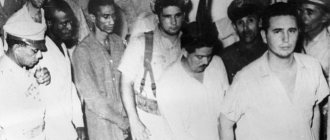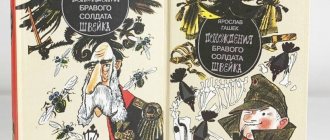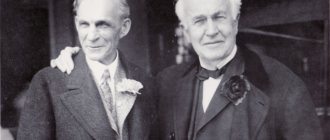Soldier in memoirs and fiction
| On the way to Paris, a magnificent dinner was prepared for the Sovereign in Beauvais by the local bishop, but His Majesty did not decide to stop there, and when his companions who were with him reported to him that they would not receive such a dinner on the way, he told them in response: “For a soldier If only he had bread and water, he would be happy with that.” |
| — Andrey Nartov, “Stories about Peter the Great”, 1786 |
| It is gratifying to see a person boldly looking into the eyes of death; and here hundreds of people every hour, every minute are ready not only to accept it without fear, but - what is much more important - without boasting, without the desire to become confused, calmly and simply go to meet it. <The life of a soldier is good!> When the company was already halfway up the mountain, a pockmarked soldier with a tanned face, a white head and an earring in his ear, out of breath, ran up to the steep slope. He carried a gun with one hand and held his bag with the other. Having caught up with us, he stumbled and fell. There was laughter from the crowd. - Look, Antonich! It’s not good to fall,” said the joker-soldier in blue pants. The soldier stopped; his tired, preoccupied face suddenly took on an expression of the strongest annoyance and severity. “If only you weren’t a fool, otherwise you’re a fool,” he said with contempt, “you’re absolutely stupid, that’s what,” and he set off to catch up with the company... |
| — Leo Tolstoy, How Russian Soldiers Die, 1854 |
| Soldiers are the poorest, most pitiful class in our Orthodox fatherland. Everything that makes life special has been taken away from him: family, homeland, freedom, in a word, everything. He can be forgiven for sometimes dipping his lonely soul in half a pint of fusel. But the officers, to whom everything is given, all human rights and privileges, how do they differ from the poor soldier? (I'm talking about the Novopetrovsk garrison.) They, poor people, do not differ in anything except their uniform. |
| — Taras Shevchenko, Diary. June 14, 1857 |
| In a certain kingdom, in a certain state, there lived a man; he had two sons. The soldiers came and took the eldest son as a recruit. He served the sovereign with faith and truth, and was so happy that in a few years he rose to the rank of general. At this very time, a new recruitment was announced, and the lot fell on his younger brother; They shaved his forehead, and it so happened that he ended up in the very regiment in which his brother was a general. The soldier recognized the general, but where! he completely refuses him: “I don’t know you, and you don’t know me!” |
| — Alexander Afanasyev, Russian folk tales; "Tales of Witches", 1863 |
| - Sit down and study literature! - it used to be that the platoon officer from the commission, who at the age of fifty had risen to the rank of lieutenant, was in command, Ivan Petrovich Kopyev. And the company sits down: some on the window, some on the bunks, some on the bench. - Egorov, what is a soldier? — sitting on the table, Kopiev asks a question. Egorov stands up, points his white, expressionless eyes at Kopyev’s red nose and answers monotonously: “Soldier is a common, eminent name; everyone bears a soldier, from general to private... - You're lying! An orderly for two squads... What is a soldier, Ponomarev? - Soldier is a common, famous name, bears the name of a soldier... - You're lying. On sight for two hours! Doesn't have a name, but has a name... Vorronov, what is a soldier? “Soldier is a common, famous name; every soldier from the general to the last private bears the name of a soldier.” - Well done Voronov! - Glad to try, your honor! |
| — Vladimir Gilyarovsky, “My Wanderings”, 1927 |
| Come to our aid not only for the brave, but also for the skillful. Come to us so that you can immediately, right there next to you, quickly dig a reliable trench for yourself, hit a loose pile of earth with a shovel, press your palm into the hole for cartridges, cover a grenade from the sand with a burdock, cast your eye and set the sight. Then he lit a cigarette and said: “Hello everyone on the left and right.” Having realized that you did not start by immediately asking for help, that you do not need military nannies or mothers, you will be loved both left and right. And know that even somewhere on a distant flank, a carrier of ammunition, a messenger, or an orderly dressing wounds will certainly say to someone: - Replenishment has been sent. I saw one. Young and probably a Komsomol member. - Well! Jumping? - Nothing jumps. He sat down, dug in, kept quiet and worked. |
| — Arkady Gaidar, “Take up arms, Komsomol tribe!”, 1941 |
| The highest valor of a warrior is to die yourself and save your comrade. It was this valor that the sovereign noted... The hot Bulgarian summer began, the sun burned mercilessly, and the yellow dust of the roads firmly stuck to the sweaty soldiers' shirts. But there were no Turks. The soldiers were surprised: - What a war, brothers! It's like we're walking. - The Turk escaped, apparently. |
| — Boris Vasiliev, “They were and were not.” Book 1, 1988 |
*** So, the army loves to win and does not like a protracted war. Therefore, a commander who understands war is the master of the destinies of people, the keeper of the security of the state. Xun Tzu *** Before serving in the army, I slept well because I knew that I was being protected. During the service I slept poorly, because... I guarded it myself. After the service I don’t sleep at all, because... I know how they guard... *** Combat training is not rocket science, you have to think about it! *** A career officer is a person whom we feed in peacetime, so that in wartime he can send us to the front. Gabriel Laub *** After firing, training and live ammunition must be returned to its original condition. *** Countless nations and the strongest armies are like ants that dispute each other for a blade of grass on a heap of dirt. F. Fenelon *** Officers in the garrison are commanders of their subordinates. The commanders of the commanders are their wives. Commanding their husbands is their only activity that gives them pleasure. And we must pay tribute - many show amazing abilities in this. V. Zubkov *** Knocked down - fight on your knees, you can’t walk - advance while lying down. V.F. Margelov *** Don't dust, infantry, don't make noise, tankman. You see, by the road (under a birch tree) a signalman is sleeping peacefully. *** Covered in dust, and a branch in the ass. This is how a branch works. *** Are you here or what? How are you here or where? And don’t put on a smart face, don’t forget that you are a future officer. *** All warriors know the form [of forces] through which we achieve victory, but no one knows the form [of forces] with which we control victory. Therefore, a victorious combat [strategy] is not repeated; the forms of response to the enemy are innumerable. *** The army is work that makes life seem like a smoke break *** Anecdote: Rain. Dirt. The general is driving and sees a stuck truck on the road. So be it, he thinks, he needs help. They got out with the driver and started pushing. Everyone got dirty in the mud, but the truck was pushed out. The general, wiping the sweat and shaking the hand of the truck driver, says: “It’s heavy, it’s contagious.” “Yes,” he answers. - I’m taking a company of demobilizers home *** - Comrade demobilization, when will they give us something to eat? - Never, comrade spirit, this is the army... *** Why is February 23, Red Army Day, celebrated for only one day? Because the next day the whole army is already blue. *** I’ve been serving for a week now. There are... nonsense... 721 days and nights left until demobilization. *** There is something more powerful than all the troops in the world: it is an idea whose time has come. *** Riots, when they reach extremes, inevitably lead to the establishment of absolute power. Giulio Mazarin *** - There is such a word - “must”! - And then I won’t take the oath! - Eh, my friend! You are young... It is not you who choose the oath, but the oath that chooses you!.. Ensign, write down these simple, but at the same time, great words. *** What kind of appearance do you have, comrade cadet? His trousers are not ironed, his face is unshaven - like a five-year-old! *** How many times have I told you not to read in lectures! I rose to the rank of major and didn’t read a single book, and, as you can see, I didn’t die. *** The colonel is walking along the parade ground. Three soldiers are approaching. - What, fighters, are we going for a walk, chilling out? What are the last names? - Ivanov, Petrov, Sidorov! - Are you all brothers here, or what? - No, comrade colonel, just namesakes! *** This is how men hold a cigarette! And only men put their feet like that. With a gesture of an uninflated hand, you catch a car on any road. With you it’s not scary in the sea and in the mountains, on a hike around the fire and in a restaurant. Confidence in piercing eyes - The whole world lies in your pocket! And the cash flow flows like a river, You look good in jeans and a white dress. I can’t imagine myself with anyone else! Love you! And it's like a curse! I'm dragging along in an old BMW X-5, ruining my escort. It’s pounding in your swollen head again, That your dad, of course, will be against. No one is decreeing you today You whisper - I’m yours, take it, Raspilin! And I take... As if for the very last time... And I am powerless to refuse you love. *** This rain does not fall on the street, But it pours in my soul... The unknown is frightening. But no one will understand, What kind of trouble my heart is pouring... And now even the knock of cars is not important, And I don’t care about the trembling of my hands... I already have a hundred reasons inside me, A hundred daggers stabbed into my chest. And my friends say that I’m going crazy, That I’m losing my mind... But I don’t care, I’ll drink a little wine, And I whisper to the guitar: “Sing”... *** I’m waiting. I’m just waiting for happiness... autumn, tender happiness. I’m waiting for clouds, dawn and fog, waiting for a hurricane to fall in the distance. I’m waiting, then, your cute outline, then the description!.. I’m waiting for a breath of air in this wilderness. I just ask you not to put it out! I'm waiting for the grass to wither and for your head to start working. I'm waiting, I'm still waiting... but time is not forever. You just have to wait, look, endlessly...
The best sayings of defeated enemies about the courage of the Russian soldier
The Russian soldier has always amazed his adversaries with his steadfastness, strength and courage. The enemy, often, simply lost hope of breaking the Russians, who fearlessly went on the attack, without fear of pain or death, and won victory after victory. Impressed by the invincibility of the Russian people, the enemies spoke of our compatriots as great indestructible warriors who instilled fear and horror in the hearts of those who opposed them.
energysmi.ru
Japanese lieutenant Tadeuchi Sakurai, who participated in the siege of Port Arthur, was greatly impressed by how Russian soldiers withstood a heavy blow for a long time, courageously repelling the attack of Japanese troops.
“Despite all our bitterness against the Russians, we still recognize their courage and bravery, and their stubborn defense for 58 hours deserves deep respect and praise.”
photos.wikimapia.org
Russian sailors also showed their best side, proving their valor and courage in battles. They are ready to fight as long as the ship remains afloat. This is confirmed by the words of a French naval officer who saw with his own eyes the battles of the Russian ships “Varyag” and “Koreets”, who fought to the last.
“The battle between the Varyag and the Korean, which met shells from six large Japanese ships and mines from eight destroyers, will remain an unforgettable event of the current century. The heroism of the Russian sailors not only did not give the Japanese the opportunity to capture both ships, but prompted the Russians to leave the battle only after the enemy squadron had suffered sensitive defeats.”
photoshare.ru
The Russian soldier is ready to fight even when the situation is obviously losing, going on the attack practically with his bare hands. This was the case with the rearguard 20th Corps of the 10th Russian Army, which died in East Prussia on the fields of the First World War. The soldiers, left without ammunition, fearlessly rushed at the enemy in a bayonet attack under the fire of German machine guns and artillery pieces. The German military commander Brandt, who saw everything with his own eyes, was literally stunned by the heroism of the Russian soldiers.
“The attempt to break through was complete madness, but this holy madness is heroism, which showed the Russian warrior as we know him from the time of Skobelev, the storming of Plevna, the battles in the Caucasus and the storming of Warsaw! The Russian soldier knows how to fight very well, he endures all sorts of hardships and is able to be persistent, even if he inevitably faces certain death!”
moiarussia.ru
The Russian pilots did not go unnoticed, delicately destroying enemy planes under a hail of bullets. The fearlessness of our pilots has always made any enemy tremble with fear. A military observer for the Austrian publication Pester Loyd wrote about this during the First World War.
“It would be funny to talk about Russian pilots with disrespect. Russian pilots are more dangerous enemies than French ones. Russian pilots are cold-blooded. There may be a lack of systematicity in Russian attacks, just like the French, but in the air, Russian pilots are unshakable and can endure heavy losses without any panic; the Russian pilot is and remains a terrible adversary.”
bivouac.ru
When the enemy got as close as possible, the Russian soldier, not wanting to surrender to the enemy, preferred to burn in a tank, to be rammed by an airplane, to sink along with his ship, but not to be surrendered to the enemy alive. The Chief of the General Staff of the Ground Forces of Nazi Germany, Colonel General Franz Halder, was extremely surprised by the categorical reluctance of the Russians to surrender.
“It should be noted the tenacity of individual Russian formations in battle. There have been cases when garrisons of pillboxes blew themselves up along with the pillboxes, not wanting to surrender."
gallery.ru
The enemies were also surprised by the cunning of the Russian warrior, who, with the help of resourcefulness, emerged victorious from the most difficult situations. Field Marshal of the Wehrmacht Erich von Manstein recalled how the Russians more than once managed to fool the Nazis.
“It often happened that Soviet soldiers raised their hands to show that they were surrendering to us, and after our infantrymen approached them, they again resorted to weapons; or the wounded man feigned death, and then shot at our soldiers from the rear.”
smallarms.ru
At all times, the most terrible thing for any adversary was that the Russian soldier only hardened in battle, becoming even stronger and more dangerous. Field Marshal of the Wehrmacht Ludwig von Kleist spoke about the amazing metamorphoses of the Russians.
“The Russians showed themselves to be first-class warriors from the very beginning, and our successes in the first months of the war were simply due to better training. Having gained combat experience, they became first-class soldiers. They fought with exceptional tenacity and had amazing endurance."
muz4in.net
The chief of staff of the 4th Army of Nazi Germany, General Günther Blumentritt, was imbued with true respect for the Russian soldier, capable of withstanding any difficulties, no matter what.
“The Russian soldier prefers hand-to-hand combat. His ability to endure hardship without flinching is truly amazing. This is the Russian soldier whom we came to know and respect a quarter of a century ago.”
Monetnik.ru
The Russian man, who stood guard over his Fatherland, always instilled fear and awe in the minds of enemies who dared to challenge the Russian. Anyone who found himself on the other side of the front line sooner or later realized that it was simply impossible to break a Russian soldier. He will stand to the last, bravely fighting any opponent and in any situation.
Soldier in verse
| Don't ask what kind of redoubt there is, Go where they lead. |
| - That's right, there's science here, On the contrary, you can’t trample here. Tell me, it’s a simple thing Do you have a? - Which? - Louse. And, dipping the crust into the lard, Continuing to eat evenly, He smiled like Terkin And said - Partially there... - So there is? Then you are a warrior Worthy of reasoning with me. You are a soldier, although you are young, And a soldier is a brother to a soldier. |
| — Alexander Tvardovsky, “Vasily Terkin. Two soldiers", 1941-1945 |
| The soldier is always healthy. The soldier is ready for anything. And dust, like from carpets, We are driving out of the way. |
| - Vladimir Vysotsky |
| Across the scorched plain, Meter by meter. They are walking through Ukraine, Soldiers of the Center group. |
| - Vladimir Vysotsky |
| Well, why are we, soldiers, to blame? That our guns are not sheathed? While the adversaries are still raging, You can't do without fights and war. |
| - Vladimir Vysotsky |
| Sleep well, brothers, everything will come again. New commanders will be born. New soldiers will receive Eternal government apartments. |
| — Bulat Okudzhava |
Soldier in popular science literature and journalism
| The name of a soldier simply contains all the people who are in the army, from the highest General even to the last musketeer, cavalry and foot. |
| — “About the exercise, about preparation for the march, about the ranks and positions of regimental ranks.” |
| A retired soldier tailored, made shoes, or, duty-free, opened the smallest but most popular tobacco factory, i.e. I crushed the “dubek-samokrashe” and grated the smelling “pertyunets” or “prochukhray” in a clay pot, mixing it with pure ash for weight, and for the bouquet and for strength - good Russian hellebore. And if the smelling “pertyunets” or “prochukhray” so cleverly prepared was to the taste of the peasants and their noses became avantageous, then the honest gentleman lived off of this parcel-free production. The gentleman did not care about the fact that duty-free trade in “procurable goods” brings a loss to the state fiscus. - Who knows? - he said, - where can I get it? I don't want to steal. And he didn’t steal, but only spoiled the peasants’ noses with ash and hellebore, but still didn’t go to plow, he said: “I’m out of the habit, a broken bone hurts.” |
| — Nikolai Leskov, “The Jew in Russia: Some Notes on the Jewish Question,” 1883 |
| Meanwhile, our forces are increasing every day with fresh, vigorous troops. It’s lovely to look at our soldiers, natives of the southern provinces, resounding with their songs in the valleys of Dashichao and Khaichen. These songs are picked up by the echo of the mountains and, we think, if their echoes reached the Japanese, they would be more afraid of them than the crackling of batteries and the whistling of bullets. Then mighty, invincible Rus' sings. — “In the active army”, 1904 |
| — Nikolai Heinze |
| The Red Army was not an army in the modern sense of the word, but it was formidable for that time, because all of Europe was tired of war, all of Europe was tired of shedding blood, and there was no real army anywhere that could resist them. The European soldier, the Volunteer Army soldier, were soldiers, but not murderers. They killed out of necessity. The Red Army communists were murderers. They not only did not see murder as a sin, but saw it as prowess, and considered robbery and pogroms to be a normal phenomenon. |
| — Pyotr Krasnov, “From the Double-Headed Eagle to the Red Banner”, 1922 |
| Having paid all his attention to the individual education of the soldier (“the holy gray beast”), Dragomirov completely overlooked the officer, moreover, he deliberately ignored the officer (his always ironic and contemptuous “gas-pa-din officer!”). By deliberately belittling and humiliating the officer's authority, Dragomirov thought to create popularity for himself both among soldiers and in society. |
| — Anton Kersnovsky, History of the Russian Army, 1938 |
| The Veneti, or Slavs, prefer to fight their enemies in places overgrown with trees or in gorges, using ambushes, surprise night attacks and other military tricks to great advantage. Slavic warriors are also very experienced in crossing rivers, and in this matter they have no rivals. If necessary, they somehow sink to the bottom of rivers and courageously withstand being under water for many hours, holding a hollowed out reed in their mouth, and breathe like that, and the enemies, believing that it is a naturally growing reed, pass by. Sometimes, as if under the influence of confusion, they abandon their prey and run into the grove, and when the enemy attacks the abandoned bait, they quickly return and inflict great damage on the enemy. The Slavs go into battle with spears and shields in their hands, but without armor and often have no other clothing on them except linen pants. They are very tall, have enormous strength, easily endure cold, heat, nakedness or lack of food and are indifferent to any kind of deprivation, but they are distinguished by an extraordinary love of freedom, and they cannot in any way be persuaded to slavery... They say that the chastity of Slavic women is superior any performance. They say that most of them consider the death of their husbands on the battlefield to be their own death and voluntarily strangle themselves, not seeing a worthy existence in widowhood. |
| — Antonin Ladinsky, “In the Days of Caracalla”, 1959 |
| A. I. von der Hoven rejected all objections to repeating rifles (high consumption of cartridges, slow reloading, heating of the barrel), considering them unfounded. He emphasized the role of the psychological factor - one cannot leave a Russian soldier with a single-shot gun, while the enemy will have a magazine-fed one. The Russian soldier must know that “in numbers he will prevail over the enemy.” A. I. von der Hoven ridiculed the objections of opponents of the shops: “It’s difficult to take guard duty.” “But what is more important,” he asked, “shooting or being sent on guard?”} |
| — Vladimir Mavrodin, Valentin Mavrodin, “From the history of domestic weapons. Russian rifle", 1981 |









